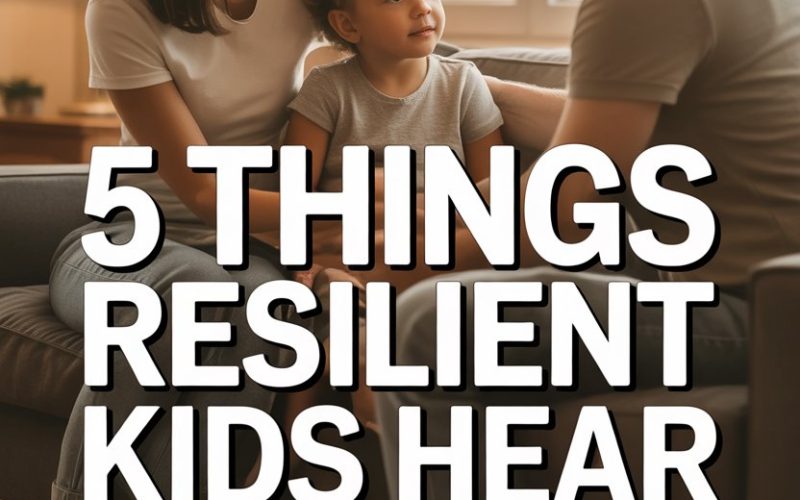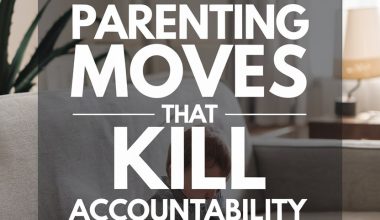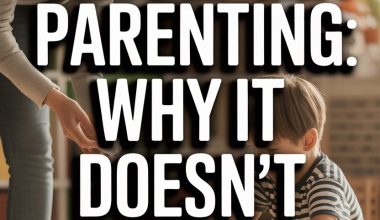Stiff upper lip? Soldier on?
While those old classics might have worked for your granddad, today’s resilient kids aren’t just toughing it out—they’re developing real grit, confidence, and bounce-back-ability, all thanks to a steady stream of supportive words from parents who know what’s up.
Raising a child who can handle life’s curveballs without crumbling into a heap of tears and biscuit crumbs is no small feat.
But much of this magical resilience starts with what you say at the kitchen table, in the car, or when someone’s lost their football boots again.
Turns out, the messages kids hear from their parents really do become the stories they tell themselves. Here are the five things every resilient kid hears—often, and in more ways than one.
1. I Believe in You (Even When You’re Not Sure)
Not every child is born roaring with self-confidence. Some are more like cautious meerkats, peering out from behind Mum’s leg, hoping the world won’t notice them.
That’s where a parent’s unwavering faith swoops in. “I believe in you” is more than just a sweet phrase—it’s rocket fuel for a child’s courage.
Resilient kids often report that they knew their parents truly thought they could handle tough challenges—even when they were wobbling.
According to research from the University of Pennsylvania’s Angela Duckworth, kids with parents who express confidence in their abilities are more likely to push through setbacks and keep trying, even if they don’t succeed at first.
How does this sound in real life?
- “I saw how hard you worked on that puzzle. You can do tricky things—even if you need a break.”
- “I know you’re nervous about that recital, but I’ve seen you practice. You’ve got this.”
The key is to be specific. Blind optimism (“You’re the best at everything!”) is less believable than actual, observed evidence of effort or growth.
And when you say it, mean it. Kids can spot fake encouragement faster than you can say “YouTube unboxing video.”
2. It’s Okay to Make Mistakes (Seriously, Nobody’s Perfect)
Kids who bounce back from failure don’t think mistakes are the end of the world—they see them as speedbumps on the road to getting better.
This attitude often starts at home, long before the first spelling test disaster or science project meltdown.
Resilient kids hear versions of, “It’s okay to mess up. Everyone does.” Even better? Parents share their own blunders—without making it a cringe-worthy confession.
According to child psychologist Dr. Rachel Busman, when parents normalize errors and admit their own, kids are less likely to panic when things go sideways.
Try these in your next “please-don’t-launch-the-toaster” moment:
- “Well, I burnt the toast again. Guess I need to pay more attention, too!”
- “Oops, I forgot my keys. Grown-ups mess up, just like kids do.”
Instead of rushing in with a solution, pause. Ask: “What do you think you’ll try next time?”
This tiny tweak can transform a meltdown into a moment of growth, and your child will learn that resilience often means picking yourself up, dusting off, and giving it another go.
3. You Don’t Have to Figure This Out Alone
Strong kids aren’t lone wolves. They know how to ask for help, and they’re not ashamed to do it. That’s something they pick up at home, where “You don’t have to do this by yourself” is more than just a safety net—it’s a lifeline.
When parents signal that it’s okay to reach out, kids feel less isolated when the going gets tough.
According to Professor Marc Brackett at Yale’s Center for Emotional Intelligence, children who feel connected are more likely to bounce back from setbacks.
How do you weave this into daily life?
- “I’m here if you want to talk about what happened at school.”
- “Even grown-ups ask for help. Nobody knows everything.”
Model asking for help yourself—text a friend for a recipe, ask your partner about that mysterious school newsletter, or even Google how to fix the Wi-Fi (again).
When kids see you reaching out, they learn that resilience doesn’t mean going it alone. Sometimes, it takes a village—and a decent group chat.
4. I Love Watching You Try
Resilience flourishes in an environment of encouragement, not pressure. The difference? One says, “I’m proud of your effort,” while the other shouts, “Win or else!”
Resilient kids grow up hearing that the act of trying—not just succeeding—matters to their parents.
Stanford psychologist Carol Dweck’s research on growth mindset highlights that praising effort, rather than talent or outcome, helps kids take on challenges, risk failure, and keep going.
Easy in theory, trickier when you’re watching your child attempt to learn the recorder for the third night in a row.
Here are some real-world phrases to tuck in your back pocket:
- “You stuck with that maths problem for ages. I love seeing how hard you work.”
- “Wow, you didn’t quit, even when it got really tricky. That’s brave.”
The more you celebrate the process, not the result, the more likely your child will be to keep at it—even if things get sticky. Cue the parade for effort, not just the gold medals.
5. How Can We Make This Better Next Time?
Every parent has survived a mini-drama: The epic tantrum in the supermarket, the forgotten trainers on PE day, the science project that looked much better in your head.
Resilient kids don’t just get talked through these moments—they get guided to reflect, regroup, and improve.
The phrase “How can we make this better next time?” opens the door for problem-solving, instead of stewing in guilt or shame. This isn’t a cover for “Why did you mess up?”—it’s a genuine invitation to brainstorm and plan.
Research from Harvard’s Center on the Developing Child underscores how reflection and planning are key resilience skills, especially when kids participate in coming up with the next steps.
Try these approaches:
- “What would help you remember your lunchbox tomorrow? Should we set a reminder, or pack it tonight?”
- “That argument with your sister looked rough. Any ideas for handling it differently?”
You don’t need to launch a TED Talk on cognitive restructuring—just a couple of questions, a listening ear, and a willingness to try something new.
The message is simple: Stuff happens, but we can always try again, together.
Say It Like You Mean It
Raising resilient kids isn’t about shielding them from every hard knock or turning life into a never-ending motivational poster.
It’s about sprinkling their days with real, believable encouragement and practical support—messages that stick long after the last juice box has been emptied.
The next time your child faces a hurdle, big or small, remember: Your words don’t have to be perfect.
A dash of honesty, a pinch of humour, and a big scoop of faith in your child’s ability to grow—these are the ingredients resilient kids thrive on.
They’ll mess up. You’ll mess up. And together, you’ll muddle through, a little more unbreakable each time.




